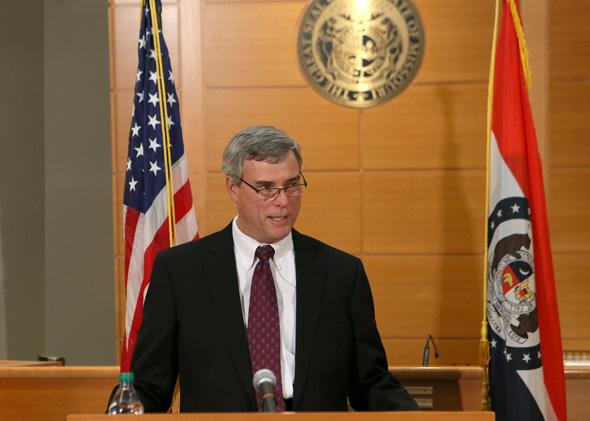It was a big Monday night for St. Louis County prosecutor Robert McCulloch. Stepping to the lectern, with the eyes of the country fixed firmly on Ferguson, McCulloch used his moment in the spotlight to deliver an odd, extended ramble before finally declaring that no charges would be filed against police officer Darren Wilson in the shooting death of Michael Brown. As we think about the subsequent outrage, feast on images of the looting and fires, and pore over the damage assessments and arrest counts, it is worth taking a moment to talk about the road to this ruinous place and the ways in which McCulloch’s decisions exacerbated the problem.
Make no mistake about it—police shootings are complicated cases to investigate, and even harder ones to prosecute. Add a potent racial dimension to the mix and there is almost no way to satisfy the profoundly divergent constituencies with an interest in the case. And there are few things elected officials like McCulloch enjoy less than being forced to decide issues that will alienate voters.
So McCulloch did something sneaky. He decided to foist the responsibility for an inevitably unpopular decision onto the members of the grand jury. By letting them make the ultimate decision, McCulloch hoped that he would be absolved of the responsibility for either prosecuting a cop or freeing a man many saw as a murderer.
But in order to do this, McCullough first needed to sell the notion that the grand jury was an independent body. And while there is some historical basis for this claim, in modern America, the grand jury is by no means independent. Rather, it is completely controlled by and ultimately loyal to the prosecutors who submit cases to it. This reality is sufficiently well-known that McCulloch realized that merely claiming that the grand jury would be independent wouldn’t turn the trick. His solution: pledging to change the very nature of how the grand jury works by fundamentally altering its mechanics. McCullough set out to show that in the Wilson case the grand jury was indeed an independent body and that McCulloch was, rather than its overseer, merely its mouthpiece. Rather than frame the case and present carefully curated evidence designed to obtain the result the prosecution sought, McCulloch insisted that the grand jury presentation in the Wilson case would be “open.” That is, the prosecutors would present all the evidence, for every side, and would take no stand, nor play any role in the evaluation of that evidence.
It was, in a way, a brilliant move—McCulloch wrapped himself in a profound loyalty to one of the few unimpeachable virtues in politics: transparency. Indeed, by opening up the process and potentially bringing democracy to one of the dark autocratic corners of the criminal justice system, McCulloch might have been able to do a good thing while at the same time actually managing to shirk responsibility for the very decision he wanted to avoid making. And he might have pulled it off, but for the bizarre self-justifying ramble that was his press conference.
As McCulloch stood in what appeared to be a courtroom—a place where protracted throat clearing and extensive preamble is commonplace—he put the lie to the entire process. Rather than take the podium, announce the decision, and then go on to explain the process and answer questions, McCulloch launched into a lengthy disquisition on the evidence, detailing the physical evidence and the ways in which it both discredited many of the witnesses who claimed to have seen what happened and supported the version of events that had a terrified officer firing in self-defense while being attacked in his car. Over the course of almost 20 minutes, McCulloch didn’t merely fail to get to the question on everyone’s mind, he implicitly demonstrated the very thing he’d spent weeks denying—that he had everything to do with the decision.
What became clear in his rambling presentation was that, just like in every other case, McCulloch had used his role as “legal adviser” to the grand jury to structure evidence and frame the presentation in such a way as to yield the very conclusion suspicious residents of Ferguson always feared. Robert McCulloch hadn’t changed the nature of the grand jury process after all. He hadn’t ceded autonomy to an independent body, he’d done what prosecutors have always done: presented his case to the grand jury, and placed his thumb squarely on the scale. And that may be why, before he even finished the Q&A, windows were smashed, cars were set ablaze, and tear gas began to waft over Ferguson.
There is no question that McCulloch is right when he says that none of us know the evidence the way the grand jury does. And it may well be that the decision not to indict Wilson was legally proper. But what’s improper about what happened was peddling the idea of grand jury independence as a cover for political cowardice. So despite what McCulloch might want, the rage that is spilling over in Ferguson shouldn’t be focused on the grand jury, but rather on the corrupting role of a governmental power that has so neutered the traditional function of grand juries that even when they are supposedly open they cannot truly escape the long shadow of prosecutorial influence.
